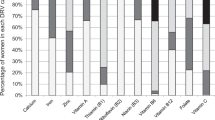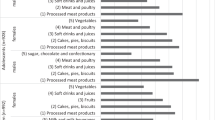Abstract
Objective: To compare the evidence derived from blood biochemical status indices with the evidence from a questionnaire and from a 4-day weighed dietary record of micronutrient supplement use in the British National Diet and Nutrition Survey (NDNS) of People Aged 65 Years and Over; to resolve some apparent incompatibility between nutrient intake and status estimates, and to recommend an approach towards supplement recording that should improve accuracy.
Design: The survey procedures described in the National Diet and Nutrition Survey Report (1998) included a health-and-lifestyle questionnaire, a 4-day weighed diet record, and fasting blood and urine sample for biochemical indices, including a wide range of micronutrients.
Setting: Eighty randomly selected postcode sectors from mainland Britain during 1994–1995.
Subjects: Of 2060 people interviewed, 1467 provided a blood sample and 1217 provided both a blood sample, and a complete 4-day diet record. About 20% were living in institutions such as nursing homes, and the remainder were living in private households.
Results: After assigning the subjects to four categories by the use of dietary supplements (A, those not taking supplements (by questionnaire or by the 4-day record); B, those taking supplements (excluding prescribed ones) by questionnaire only; C, those taking supplements by 4-day record only; and D, those taking supplements by both questionnaire and 4-day record), these categories were then compared with respect to estimated total nutrient intakes and blood biochemical indices. Those in category B had estimated (4-day) nutrient intakes (from foods and supplements) that were indistinguishable from those in category A, but had biochemical indices that indicated significantly higher dietary intakes of several vitamins.
Conclusions and recommendation: The 4-day weighed intake record may not have identified all of the subjects who were regularly taking micronutrient supplements in amounts sufficient to improve their biochemical status. Because survey respondents may use supplements irregularly or change their usual patterns of supplement use during a period of intensive diet-recording, it is important to design a dietary instrument that will minimise this potential source of inaccuracy. We therefore recommend that population surveys in which an accurate estimate of micronutrient intakes is required, from supplements as well as from food, should record supplement use for a period longer than 4-days. It is likely that a better estimate of long-term intakes can be achieved by combining a 4-day weighed diet record with a structured recall or several weeks of diary records, which focus specifically on the use of supplements.
Sponsorship: The study was part of the National Diet and Nutrition Survey of People Aged 65 Years and Over, which was funded jointly by the Ministry of Agriculture, Fisheries and Food and the Department of Health, and conducted by Social and Community Planning Research in conjunction with the MRC Dunn Nutrition Unit. The authors acknowledge additional financial support from the European Commission.
This is a preview of subscription content, access via your institution
Access options
Subscribe to this journal
Receive 12 print issues and online access
$259.00 per year
only $21.58 per issue
Buy this article
- Purchase on Springer Link
- Instant access to full article PDF
Prices may be subject to local taxes which are calculated during checkout
Similar content being viewed by others
Author information
Authors and Affiliations
Rights and permissions
About this article
Cite this article
Bates, C., Prentice, A., van der Pols, J. et al. Estimation of the use of dietary supplements in the National Diet and Nutrition Survey: People Aged 65 Years and Over. An observed paradox and a recommendation. Eur J Clin Nutr 52, 917–923 (1998). https://doi.org/10.1038/sj.ejcn.1600665
Received:
Revised:
Accepted:
Published:
Issue Date:
DOI: https://doi.org/10.1038/sj.ejcn.1600665
Keywords
This article is cited by
-
Use of dietary supplements in the European Prospective Investigation into Cancer and Nutrition calibration study
European Journal of Clinical Nutrition (2009)
-
Serum vitamin B12 concentrations and atrophic gastritis in older New Zealanders
European Journal of Clinical Nutrition (2005)
-
In a population study, can parathyroid hormone aid the definition of adequate vitamin D status? A study of people aged 65 years and over from the British National Diet and Nutrition Survey
Osteoporosis International (2003)



